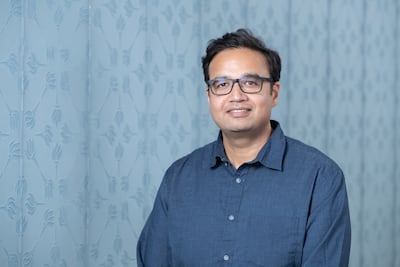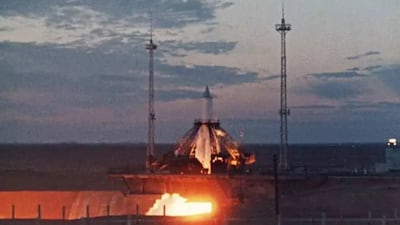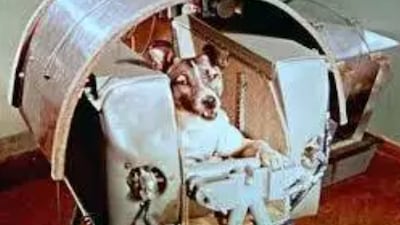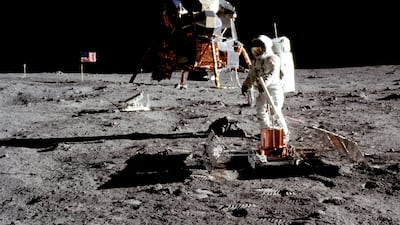A simple “beep-beep” signal broadcast from space 67 years ago on October 4 sent shockwaves across the world.
This mysterious sound, emitted by the world’s first artificial satellite, Sputnik-1, travelled from Earth’s orbit into homes, schools and labs worldwide, capturing the imaginations of people all over the globe.
Launched by the former Soviet Union in 1957, Sputnik-1 was not just the beginning of the space age – it was a pivotal moment that transformed global politics, military strategies and cultural perceptions.
The impact of this historic day is commemorated each year through World Space Week, an annual celebration held from October 4 to 10, marking both the anniversary of Sputnik-1’s launch and humanity's collective achievements in space exploration.
Oleksa Drachewych, a history professor at Western University in Ontario, Canada, told The National that the satellite was a “technological victory” for the Soviet Union during the Cold War, and one that led the US to form Nasa.
“The Americans believed that the Soviets were a notable threat, as Soviet leadership in space exploration was deemed a security concern, while it also questioned American superiority in scientific exploration and technological development,” he said.
“The result was that the United States was spurred to increase its funding on education, scientific and technological development, including with regards to space exploration.
“The Soviets, meanwhile, could use the successes of Sputnik and its following efforts into space exploration to suggest it was more technologically advanced, and in turn, that communism was more advanced than capitalism and liberal democracy.”
Simple but powerful
At its core, Sputnik-1 was a relatively simple device. It weighed 83.6kg and measured just 58cm in diameter, yet it achieved what no human-made object had done before – it became the first to orbit Earth.
Travelling at a speed of 29,000kph, it completed one orbit of the planet about every 90 minutes, at an altitude ranging from 215km to 939km.
As it circled the globe, it transmitted its repetitive “beep-beep” radio signal, which could be picked up by amateur and professional radio operators worldwide.
Sputnik-1's signal continued for 21 days before its batteries ran out, but the satellite remained in orbit for nearly three months before re-entering Earth’s atmosphere and burning up on January 4, 1958.
“Sputnik-1 largely began modern space exploration and satellite navigation,” said Mr Drachewych. “It showed that sending a satellite into low-Earth orbit was possible, and its successors offered further promise for scientific endeavours.”
Although Laika died a few hours after launch, the mission further showcased Soviet capabilities.
By 1961, the Soviets once again led the Space Race with Yuri Gagarin, the first human to orbit Earth.
Over the following decades, the US and Soviet Union intensified their space programmes, launching satellites and sending humans into space and, in Nasa's case, on to the Moon.
A lasting legacy
Dr Dimitra Atri, a professor and astrophysicist at the New York University Abu Dhabi, told The National that the era had an impact across various industries and not just the space sector.
“This era sparked new aspirations for exploring the Moon, Mars and even interstellar travel, giving rise to a vibrant new genre of science fiction in literature, television, and film,” he said.
“The impact of what I term the ‘Sputnik Revolution’ on the American psyche was so profound that as the Apollo 11 astronauts journeyed to the Moon, they wondered whether they might encounter a Soviet probe along the way.”
By the late 20th century, both superpowers had achieved remarkable feats in space exploration, but the collapse of the Soviet Union in 1991 left Russia with a space programme rich in history but facing numerous challenges, including a lack of financial resources.
In the aftermath of the Soviet collapse, Russia joined forces with Nasa and three other space agencies to build the International Space Station, which has remained a symbol of collaboration in space, despite political disagreements on Earth.
The ISS has served as a crucial platform for scientific research and international co-operation, but with the station set to retire in the near future, Russia is expected to redirect its resources to other space projects – including potential lunar missions and partnerships with China.
In recent years, Russia’s space programme has also faced competition from new players, particularly private companies like SpaceX, which have revolutionised the industry with cost-effective launches.
Russia, however, remains a key player, especially with its Soyuz spacecraft, which continues to reliably transport astronauts to and from the ISS, said Dr Atri. But he said there has been a lack of progress in other areas.
“Although it’s a remarkable achievement, the country has not made significant progress in planetary missions. I think their planetary programme will see a revival through collaboration with China,” he said.
The country’s strategic partnership with China involves developing a joint research base on the Moon. This also reflects the growing political divide between Russia and the West, intensified by Moscow's invasion of Ukraine in 2022.
“Currently, several agencies around the world are planning missions to Venus to study its surface, among other objectives – an achievement the Soviet space programme accomplished in the late 1970s and early 1980s by sharing with us the only photographs of the planet's surface.” said Dr Atri.
The Russia-China alliance also marks a shift in the global space landscape, as both nations aim to challenge US dominance in space exploration.
Meanwhile, China and the US are engaged in a new space race to place the next human on the Moon by the end of this decade.
SPEC%20SHEET%3A%20APPLE%20M3%20MACBOOK%20AIR%20(13%22)
%3Cp%3E%3Cstrong%3EProcessor%3A%3C%2Fstrong%3E%20Apple%20M3%2C%208-core%20CPU%2C%20up%20to%2010-core%20CPU%2C%2016-core%20Neural%20Engine%3C%2Fp%3E%0A%3Cp%3E%3Cstrong%3EDisplay%3A%3C%2Fstrong%3E%2013.6-inch%20Liquid%20Retina%2C%202560%20x%201664%2C%20224ppi%2C%20500%20nits%2C%20True%20Tone%2C%20wide%20colour%3C%2Fp%3E%0A%3Cp%3E%3Cstrong%3EMemory%3A%3C%2Fstrong%3E%208%2F16%2F24GB%3C%2Fp%3E%0A%3Cp%3E%3Cstrong%3EStorage%3A%3C%2Fstrong%3E%20256%2F512GB%20%2F%201%2F2TB%3C%2Fp%3E%0A%3Cp%3E%3Cstrong%3EI%2FO%3A%3C%2Fstrong%3E%20Thunderbolt%203%2FUSB-4%20(2)%2C%203.5mm%20audio%2C%20Touch%20ID%3C%2Fp%3E%0A%3Cp%3E%3Cstrong%3EConnectivity%3A%3C%2Fstrong%3E%20Wi-Fi%206E%2C%20Bluetooth%205.3%3C%2Fp%3E%0A%3Cp%3E%3Cstrong%3EBattery%3A%3C%2Fstrong%3E%2052.6Wh%20lithium-polymer%2C%20up%20to%2018%20hours%2C%20MagSafe%20charging%3C%2Fp%3E%0A%3Cp%3E%3Cstrong%3ECamera%3A%3C%2Fstrong%3E%201080p%20FaceTime%20HD%3C%2Fp%3E%0A%3Cp%3E%3Cstrong%3EVideo%3A%3C%2Fstrong%3E%20Support%20for%20Apple%20ProRes%2C%20HDR%20with%20Dolby%20Vision%2C%20HDR10%3C%2Fp%3E%0A%3Cp%3E%3Cstrong%3EAudio%3A%3C%2Fstrong%3E%204-speaker%20system%2C%20wide%20stereo%2C%20support%20for%20Dolby%20Atmos%2C%20Spatial%20Audio%20and%20dynamic%20head%20tracking%20(with%20AirPods)%3C%2Fp%3E%0A%3Cp%3E%3Cstrong%3EColours%3A%3C%2Fstrong%3E%20Midnight%2C%20silver%2C%20space%20grey%2C%20starlight%3C%2Fp%3E%0A%3Cp%3E%3Cstrong%3EIn%20the%20box%3A%3C%2Fstrong%3E%20MacBook%20Air%2C%2030W%2F35W%20dual-port%2F70w%20power%20adapter%2C%20USB-C-to-MagSafe%20cable%2C%202%20Apple%20stickers%3C%2Fp%3E%0A%3Cp%3E%3Cstrong%3EPrice%3A%3C%2Fstrong%3E%20From%20Dh4%2C599%3C%2Fp%3E%0A
Brief scores:
Juventus 3
Dybala 6', Bonucci 17', Ronaldo 63'
Frosinone 0
FIGHT CARD
From 5.30pm in the following order:
Featherweight
Marcelo Pontes (BRA) v Azouz Anwar (EGY)
Catchweight 90kg
Moustafa Rashid Nada (KSA) v Imad Al Howayeck (LEB)
Welterweight
Mohammed Al Khatib (JOR) v Gimbat Ismailov (RUS)
Flyweight (women)
Lucie Bertaud (FRA) v Kelig Pinson (BEL)
Lightweight
Alexandru Chitoran (BEL) v Regelo Enumerables Jr (PHI)
Catchweight 100kg
Mohamed Ali (EGY) v Marc Vleiger (NED)
Featherweight
James Bishop (AUS) v Mark Valerio (PHI)
Welterweight
Gerson Carvalho (BRA) v Abdelghani Saber (EGY)
Middleweight
Bakhtiyar Abbasov (AZE) v Igor Litoshik (BLR)
Bantamweight:
Fabio Mello (BRA) v Mark Alcoba (PHI)
Welterweight
Ahmed Labban (LEB) v Magomedsultan Magemedsultanov (RUS)
Bantamweight
Trent Girdham (AUS) v Jayson Margallo (PHI)
Lightweight
Usman Nurmagomedov (RUS) v Roman Golovinov (UKR)
Middleweight
Tarek Suleiman (SYR) v Steve Kennedy (AUS)
Lightweight
Dan Moret (USA) v Anton Kuivanen (FIN)
French business
France has organised a delegation of leading businesses to travel to Syria. The group was led by French shipping giant CMA CGM, which struck a 30-year contract in May with the Syrian government to develop and run Latakia port. Also present were water and waste management company Suez, defence multinational Thales, and Ellipse Group, which is currently looking into rehabilitating Syrian hospitals.
THE%20SPECS
%3Cp%3EEngine%3A%204.4-litre%20twin-turbo%20V8%20hybrid%0D%3Cbr%3EPower%3A%20653hp%20at%205%2C400rpm%0D%3Cbr%3ETorque%3A%20800Nm%20at%201%2C600-5%2C000rpm%0D%3Cbr%3ETransmission%3A%208-speed%20auto%0D%3Cbr%3E0-100kph%20in%204.3sec%0D%3Cbr%3ETop%20speed%20250kph%0D%3Cbr%3EFuel%20consumption%3A%20NA%0D%3Cbr%3EOn%20sale%3A%20Q2%202023%0D%3Cbr%3EPrice%3A%20From%20Dh750%2C000%0D%3Cbr%3E%3C%2Fp%3E%0A
Silent Hill f
Publisher: Konami
Platforms: PlayStation 5, Xbox Series X/S, PC
Rating: 4.5/5
ALRAWABI%20SCHOOL%20FOR%20GIRLS
%3Cp%3ECreator%3A%20Tima%20Shomali%3C%2Fp%3E%0A%3Cp%3EStarring%3A%C2%A0Tara%20Abboud%2C%C2%A0Kira%20Yaghnam%2C%20Tara%20Atalla%3C%2Fp%3E%0A%3Cp%3ERating%3A%204%2F5%3C%2Fp%3E%0A
Jawab Iteiqal
Director: Mohamed Sammy
Starring: Mohamed Ramadan, Ayad Nasaar, Mohamed Adel and Sabry Fawaz
2 stars
In numbers: China in Dubai
The number of Chinese people living in Dubai: An estimated 200,000
Number of Chinese people in International City: Almost 50,000
Daily visitors to Dragon Mart in 2018/19: 120,000
Daily visitors to Dragon Mart in 2010: 20,000
Percentage increase in visitors in eight years: 500 per cent
Syria squad
Goalkeepers: Ibrahim Alma, Mahmoud Al Youssef, Ahmad Madania.
Defenders: Ahmad Al Salih, Moayad Ajan, Jehad Al Baour, Omar Midani, Amro Jenyat, Hussein Jwayed, Nadim Sabagh, Abdul Malek Anezan.
Midfielders: Mahmoud Al Mawas, Mohammed Osman, Osama Omari, Tamer Haj Mohamad, Ahmad Ashkar, Youssef Kalfa, Zaher Midani, Khaled Al Mobayed, Fahd Youssef.
Forwards: Omar Khribin, Omar Al Somah, Mardik Mardikian.
UK-EU trade at a glance
EU fishing vessels guaranteed access to UK waters for 12 years
Co-operation on security initiatives and procurement of defence products
Youth experience scheme to work, study or volunteer in UK and EU countries
Smoother border management with use of e-gates
Cutting red tape on import and export of food
Teams in the EHL
White Bears, Al Ain Theebs, Dubai Mighty Camels, Abu Dhabi Storms, Abu Dhabi Scorpions and Vipers
THREE
%3Cp%3EDirector%3A%20Nayla%20Al%20Khaja%3C%2Fp%3E%0A%3Cp%3EStarring%3A%20Jefferson%20Hall%2C%20Faten%20Ahmed%2C%20Noura%20Alabed%2C%20Saud%20Alzarooni%3C%2Fp%3E%0A%3Cp%3ERating%3A%203.5%2F5%3C%2Fp%3E%0A
Dhadak
Director: Shashank Khaitan
Starring: Janhvi Kapoor, Ishaan Khattar, Ashutosh Rana
Stars: 3
UAE currency: the story behind the money in your pockets
UAE currency: the story behind the money in your pockets
The National's picks
4.35pm: Tilal Al Khalediah
5.10pm: Continous
5.45pm: Raging Torrent
6.20pm: West Acre
7pm: Flood Zone
7.40pm: Straight No Chaser
8.15pm: Romantic Warrior
8.50pm: Calandogan
9.30pm: Forever Young
THE%C2%A0SPECS
%3Cp%3E%3Cstrong%3EEngine%3A%20%3C%2Fstrong%3E2.4-litre%20four-cylinder%0D%3Cbr%3E%3Cstrong%3EPower%3A%3C%2Fstrong%3E%20210hp%0D%3Cbr%3E%3Cstrong%3ETorque%3A%3C%2Fstrong%3E%20320Nm%0D%3Cbr%3E%3Cstrong%3EPrice%3A%3C%2Fstrong%3E%20Starting%20from%20Dh89%2C900%0D%3Cbr%3E%3Cstrong%3EOn%20sale%3A%20%3C%2Fstrong%3ENow%0D%3Cbr%3E%3C%2Fp%3E%0A
The White Lotus: Season three
Creator: Mike White
Starring: Walton Goggins, Jason Isaacs, Natasha Rothwell
Rating: 4.5/5







